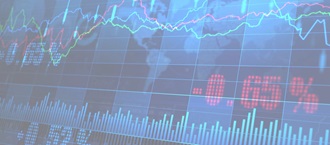Navigating Developments in the Sustainable Finance Market
On June 18th, in the heart of London’s financial district, Sustainalytics hosted its inaugural breakfast symposium, Navigating Developments in the Sustainable Finance Market. It was a full house, with over 60 engaged attendees, including Sustainalytics clients, prospects and partner financial institutions. The expert panel focused on developments and trends in the European and global sustainable finance space. Sustainalytics’ own Trisha Taneja (Sustainable Finance Solutions Product Manager) was joined by David Zahn, Head of European Fixed Income at Franklin Templeton Investments, and Heike Reichelt, Head of Investor Relations and New Products at the World Bank. Kevin Ranney (Director, Sustainable Finance Solutions) moderated the panel.
Sustainable Development Goals – Green Financing as a Bridge to the SDGs
The purpose of green financing, as stated by the UN Environment Programme, is to increase the level of financial flows (from banking, micro-credit, insurance and investment) from the public, private and not-for-profit sectors to sustainable development priorities. The aim is to align financial systems, working with countries, financial regulators and financial sectors, to direct capital allocation to sustainable development that will shape the production and consumption patterns of tomorrow. Financial mechanisms such as Green Bonds help this alignment as they promote public-private partnerships for sustainable development.
The Role of Technology Companies in Technology Addiction
The term ‘technology addiction’ describes frequent and compulsive internet, smartphone, gaming and social media use. This article focuses on the role played by technology companies and their response to compulsive use of their products and services.
Implications of the use of rare-earth elements in the wind energy market
Investors who are bullish on renewable energy are often drawn to the wind energy market. Alongside solar, wind energy has been rapidly adopted worldwide and continues to receive significant investments compared to other renewables.[i]
Mexican companies remain dedicated as government backtracks on climate commitments
Since taking office in December 2018, Mexico’s president Andres Manuel Lopez-Obrador, often referred to as AMLO, has not inspired much hope among investors in the country’s energy sector. The first six months of his presidency has confirmed investor concerns that the privatizing of the energy industry would be rolled back under AMLO, who has made energy sovereignty a cornerstone of his administration’s agenda. The contracts issued under the 2013 energy reforms have been placed under review and the energy auctions for oil, natural gas and renewables projects that were scheduled for 2018 were cancelled. The energy auctions scheme was introduced in 2015 as a key measure to achieve Mexico’s energy reduction commitments of 30 per cent and 35 per cent by 2021 and 2024, respectively.
High and Dry Down Under: Water Risk in Australia
In June, Sydney introduced water restrictions[i] amid an ongoing two-year drought in New South Wales. Authorities stated that the city was experiencing some of the lowest inflows into its catchment dams since the 1940s. At the end of the month, the City of Sydney also officially declared a climate emergency[ii], joining over 600 other local governments around the world.
ESG Ratings: A Rebuttal of Prevailing Criticisms
“No offence, but…”. This has become a common introduction to questions directed at environment, social and governance (ESG) rating providers and reflects a body of criticism centered on the premise that ESG research and ratings are fundamentally flawed.
Controversial Weapons: Regulatory Landscape and Best Practices
Since the beginning of modern warfare in the 20th century, we have witnessed the development of weapon types that have a severe, disproportionate and indiscriminate impact on civilians, even years after a conflict has ended. Over the past decades, several protest movements have attempted to halt and ban the production of specific, controversial weapon types, and many countries have adopted international conventions to this effect. More recently, some financial institutions have begun to restrict or exclude financing of companies with involvement in certain weapons. This article explores what investors can do, beyond existing legal frameworks, with respect to controversial weapons.
Demystifying Sustainability Linked Loans: Leverage your ESG Rating
While investors are increasingly focused on how their investment decisions impact the environment and key stakeholders, forward-looking lenders also have sustainability at the core of their allocation strategies. As a result, the demand for sustainable finance products has increased in recent years.
Point of Sale Financing: Inclusive for all?
What is Point of Sale Financing? Point of sale financing (PSF) is a relatively new financial product that has garnered significant interest from consumers, retailers and financial institutions. It provides financing to markets that were previously underserviced by conventional financial products but can also be a gateway to impulsive spending and poor financial choices if not managed properly. This article provides a brief overview of PSF, the pros and cons for consumers, a comparison of PSF with conventional lending vehicles and a sector review looking at policies addressing financial inclusion.
Can Italian Banks Avoid Another Financial Crisis?
Italy is the birthplace of the accounting and credit systems and is home to some of the world’s oldest banks. Despite this legacy, poor lending decisions in the past decade and a high number of non-performing loans (NPLs) is putting the Italian banking sector at risk. This article will explore the connection between responsible product marketing practices and the financial stability of Italian banks by analyzing Sustainalytics’ ESG data.
Your Company's ESG Ratings: Understanding Sustainalytics Research Process
In September 2018, Sustainalytics announced the launch of its next generation ESG Risk Ratings, which evaluate the degree to which a company's enterprise value is exposed to material ESG issues. Specifically, they measure a company's exposure to industry-specific material ESG risks, and how well that company is managing those risks. Combining the concepts of management and exposure we arrive at an absolute assessment of ESG risk that is comparable across subindustries, sectors, companies and regions.
India Raises Corporate Governance Standards
India saw several enhancements to its corporate governance framework on April 1, 2019, when the Securities and Exchange Board of India (Listing Obligations and Disclosure Requirements) (Amendment) Regulations, 2018 came into effect. The amendments to SEBI listing regulations reflect the adoption of a slew of recommendations made by the “Kotak Committee” – a blue-ribbon panel formed in June 2017 under the chairmanship of banker Uday Kotak, with the purpose of improving corporate governance standards in India. The committee’s recommendations are being phased in between October 1, 2018 and April 1, 2020.
The Water Scarcity Challenge: Opportunities for Sustainable Solutions
Water may not be a top-of-mind concern for most investors, but it could turn out to be one of the most important investment themes of the 21st century. Market opportunities related to the water industry could reach USD 1 trillion by 2025.[1] As the issues of water quality and availability continue to make headlines, more investors are searching for opportunities to mitigate social and environmental risks while supporting sustainable solutions.
Earth Day 2019 | The Water Scarcity Challenge
Earth Day 2019 is focused on protecting the species that make up our natural environment. With nearly three-quarters of the Earth’s surface covered in water, it’s a natural resource that we can’t take for granted. Human activity has irrevocably impacted this natural resource, affecting the quality and quantity of water available for consumption and for the natural habitat. In this article, we examine the role companies can play in addressing this water crisis and the potential opportunities for investors to support solutions.
Passive ESG Investing: Q4 2018 Sample Portfolio Analysis
The global equities market experienced substantial growth over the first quarter of 2019 as the FTSE All-World (AW) index returned 12.5%. But this growth spurt comes on the tail of a significant selloff during the preceding quarter; the total return of the FTSE AW over Q4 2018 sunk to -12.6%.[i]
Second Party Opinion - Green, Social and Sustainability Bonds
Issuers looking to support their sustainability strategy through sustainable finance solutions have several options, from sources of debt to equity instruments. These solutions include Green Loans, Sustainability Linked Loans, Green Bonds, Sustainable Bonds and more.
Sustainalytics’ Carbon Risk Rating: Platypus Asset Management Live Test
Climate change is at the centre of public debate: from school strikes around the world to a recent landmark court ruling blocking a new coal mine in Australia on climate grounds. It is also increasingly becoming an investment risk and investors are looking to understand how this risk can affect their portfolios.



















